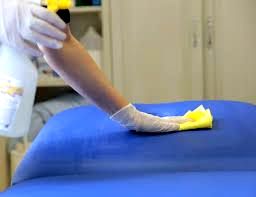Infection Control and CQC Inspections in GP Surgeries
Posted on

As a Practice Manager, keeping your GP surgery clean and infection-free is a top priority. Not only is it essential for the health of your patients, but it is also essential for your practice's reputation. In this blog post, we will discuss the importance of cleaning, infection control and CQC inspection in a GP surgery and provide tips on maintaining a clean and safe environment for your patients and staff.
Preventing Infection
Preventing infection is the primary goal of cleaning in GP surgery. It is crucial to ensure that your surgery is cleaned regularly and adequately to prevent the spread of infection between patients and staff. Regular cleaning will help to keep bacteria and viruses at bay and reduce the risk of cross-contamination. Creating and sticking to a daily cleaning schedule is essential to ensure nothing is missed. Ensure that your staff is adequately trained in cleaning and disinfecting techniques and uses the correct equipment and products.
CQC Inspections Control
The CQC (Care Quality Commission) regulates and inspects healthcare services in England, including GP surgeries. The CQC inspection control plays a vital role in ensuring that GP surgeries run effectively and safely and providing high-quality care to patients. Understanding what CQC expects and ensuring you adhere to its standards is essential. After all, failing a CQC inspection can have severe consequences for your practice, including fines and a negative reputation.
Cleaning Tips
Maintaining a clean and infection-free GP surgery can be challenging, but some cleaning tips can help you in achieving this goal:
- Ensure your surgery is cleaned daily, paying particular attention to frequently touched surfaces such as door handles, light switches, and reception areas.
- Use appropriate cleaning agents and disinfectants, following the manufacturer's instructions.
- Do not allow clutter to build up, as this can harbour bacteria and germs.
- Encourage your staff to practice good hand hygiene, such as washing hands regularly and using hand sanitiser.
Patient Expectations
Patients expect to visit a clean, safe and hygienic GP surgery. A clean environment not only provides peace of mind but also gives them the confidence that they are attending a reputable practice. Moreover, research shows that patient perception of the cleanliness of a GP surgery correlates with their satisfaction with the care they receive. So, keeping your surgery clean and meeting patient expectations can lead to better patient outcomes and increased patient satisfaction.
Importance of Professional Cleaning Services
Professional cleaning services can be invaluable in helping you maintain a clean and safe GP surgery. They have the expertise, experience, and tools required to ensure that your practice meets the highest standards of cleanliness. They can also provide you with advice and training on cleaning best practices. By investing in a professional cleaning service, you are not only ensuring that your patients receive the best possible care, but you are also reducing the workload and stress on your staff, allowing them to focus on providing patient care.
In conclusion, keeping your GP surgery clean and free from infection is crucial for the health and well-being of your patients and staff. By adhering to CQC inspection control and maintaining a clean environment, you can ensure that your practice provides high-quality patient care. Regular cleaning, using appropriate cleaning products and disinfectants, encouraging good hand hygiene amongst your staff, and investing in professional cleaning services can help achieve this goal. So, take steps today to ensure your GP surgery is clean, safe and welcoming for all who attend.
